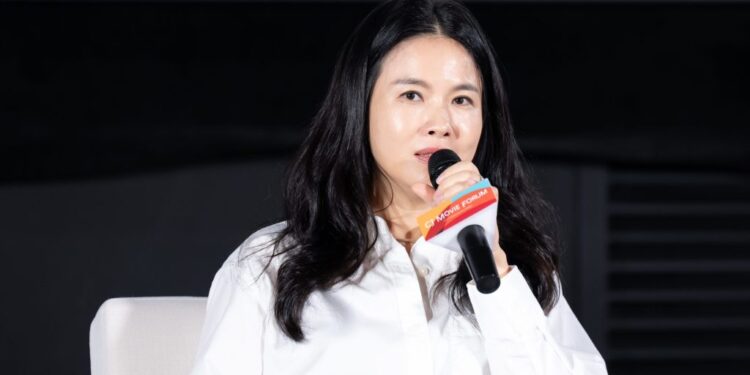Top executives at Korea‘s CJ ENM announced that they will retain their annual content spend at 1 trillion won ($750M), while acknowledging that new business models are necessary to combat the industry’s economic headwinds.
“Despite the growing uncertainty in the film industry, we will continue to support creators and enable their imaginations to come to life and shine bright,” said Yoon Sang-hyun, CEO of CJ ENM, at an event held alongside the Busan International Film Festival (BIFF).
TVING CEO Choi Ju-hui, Studio Dragon CEO Jang Kyung-ik, CJ’s Business Innovation Office Chief Lee Dong-hyun, CGV Domestic Business Division head Cho Jin-ho and Content Distribution SVP Seo Jang-ho were among those present at the event.
Cautious approach
While the media conglomerate’s executives emphasized that they were all taking a cautious approach in their respective businesses, many highlighted they have already tried and tested innovative ways to reach wider audiences and increase profits.
Besides rising production costs, Seo said that another challenge is the straight decline in ad revenue on linear tv channels. “As ad revenue falls, it is harder to commit to programming. This shortfall cannot be offset by overseas sales and quick resolution seems unlikely,” Seo stated.
On the theatrical side of the business, Lee said that the industry looks back at 2019 as the peak year for theater attendance in Korea, with the current figure now hovering at 60% of that volume.
He pointed out that box office takings for films ranking in the mid-tier has drastically declined. “This is a serious concern for the film market, even for next year. What is more concerning is that there is also no momentum to turn things around,” he added.
Cho also provided data and trends that his team has observed in CJ’s theatrical business over the last five years. Firstly, he emphasized that cinema-going is now mainly based on film choice, not seasonality. For example, theater attendance used to drastically peak in August, November and December in 2018 and 2019, but since the pandemic, these peaks are a lot more muted.
Secondly, Cho said that in many of CJ’s surveys conducted among theater-goers, he often receives feedback about the film’s length, pointing out that while feature film runtimes have increased, audiences may actually desire shorter films — a trend he attributes to the viewing habits created by the proliferation of OTT.
For OTT platform TVING, Choi pointed out that despite ranking as the number one platform domestically, TVING is not immune to the stagnating growth gripping the OTT market. She said that subscription growth is set to increase by only 5% annually.
Stabilizing market and new revenue streams
Despite the pessimistic economic outlook, Studio Dragon CEO Jang said that he observes the domestic market stabilizing.
While the number of titles produced hit a peak of 120 shows for OTT and broadcast services in 2022 before declining to 105 last year, Jang predicted that the number will settle at around 100 shows annually in the near future, with a greater demand for shorter-form content. He added that many local broadcasters and planning to revive their drama production businesses in the coming year.
The CJ executives agreed that theaters, OTT, and broadcast channels have to cooperate to maximize the IP lifecycle.
Using the example of Dongjae, the Good or the Bastard, which was a spinoff of popular crime thriller Stranger, they shared how CJ used its different businesses across linear channel, OTT, and theater simultaneously to maximize the IP’s reach and revenue. The title was produced by Studio Dragon, released and broadcasted by TVING and tvN, and was invited to BIFF for a premiere screening.
Choi said that live sports broadcasting is a top priority for TVING, having invested in gaining the rights to stream Korea’s top-flight baseball league, KBO. She highlighted that they have seen a huge wave of subscribers joining TVING through the addition of KBO content.
The subsidiaries also revealed a clear vision for global expansion. With around 20 global projects currently in development, Studio Dragon is keen to produce series formats for US and Japanese local markets. TVING is refining its global launch strategy, focusing on regions where K-content is making a significant impact, such as the US, Southeast Asia, and Japan. CJ ENM sees potential in new markets like India and the Middle East where Korean content has yet to reach stark popularity or profit.
Seo said that he went to India this year, where there is a big demand for CJ’s content. Emphasizing the need to develop new markets for CJ’s content, Seo added that the company is working with the Korean Creative Content Agency (KOCCA) to pursue new avenues and partnerships in India.
Jang added that another artistic priority for CJ ENM is to expand and develop its pool of writing talents. Pointing out the success of writers from CJ’s “O’PEN Writing Program,” Jang cited that the program’s graduates have gone on to pen the screenplays of top shows like Under the Queen’s Umbrella and Hometown Cha Cha Cha.







